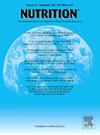蛋白质摄入和补充对心血管康复患者身体组成和功能的影响:一项系统综述和荟萃分析
IF 3.2
3区 医学
Q2 NUTRITION & DIETETICS
引用次数: 0
摘要
心血管疾病(CVD)仍然是世界范围内死亡的主要原因。营养策略,包括蛋白质摄入,通过支持整体健康和恢复,在心血管康复中发挥关键作用。这篇综述探讨了补充蛋白质可以增强肌肉质量,从而改善心血管疾病患者的身体组成和功能能力的假设。我们根据Cochrane干预措施系统评价手册对随机对照试验(rct)进行了系统评价,该方案注册号为CRD42022292687。从数据开始到2024年2月1日,在PubMed、EMBASE、Scopus和Web of Science上执行了一个综合搜索策略,包括人口、干预和研究设计术语。采用Cochrane偏倚风险评估工具(RoB 2.0)评价研究质量,采用Rstudio 3.6.2统计软件包进行meta分析。从10939个初始引用中,7个随机对照试验和3个试点随机对照试验符合入选标准。样本大小从11到70人不等,平均年龄在55到80岁之间。叙事综合揭示了补充蛋白质对机体组成和功能能力的混合影响。在几项试验中观察到瘦体重的改善,特别是当蛋白质摄入与阻力训练相结合时。然而,脂肪组织的减少并不一致。在一些试验中,特别是那些使用乳清或富含亮氨酸的蛋白质补充剂的试验中,观察到功能能力的增强,如握力和10米步行测试成绩的提高。然而,对运动能力的关键指标VO2峰值的研究结果尚无定论,一些试验报告了改善,而另一些试验显示没有显著效果。各试验的偏倚风险从低到高不等,干预类型、蛋白质剂量和研究持续时间的异质性限制了直接比较。证据确定性极低的结果包括体重指数、6分钟步行测试和VO2峰值或最大值。与此同时,在握力、脂肪量和瘦体重方面发现了低确定性的证据。总之,虽然补充蛋白质可能有助于改善身体组成和功能能力,但蛋白质类型和剂量的可变性阻碍了心血管疾病患者在心血管康复中的明确推荐。需要进一步的高质量试验和更大的样本量来为这一人群建立更具体的蛋白质摄入指南。本文章由计算机程序翻译,如有差异,请以英文原文为准。
Effect of protein consumption and supplementation on body composition and functional capacity in cardiovascular disease patients undergoing cardiovascular rehabilitation: A systematic review and meta-analysis
Cardiovascular diseases (CVD) remain the leading cause of death worldwide. Nutritional strategies, including protein intake, play a crucial role in cardiovascular rehabilitation by supporting overall health and recovery. This review explores the hypothesis that protein supplementation enhances muscle mass, leading to improved body composition and functional capacity in CVD patients. We conducted a systematic review of randomized controlled trials (RCTs) in accordance with the Cochrane Manual for Systematic Reviews of Interventions, with the protocol registered under CRD42022292687. A comprehensive search strategy, incorporating population, intervention, and study design terms, was executed across PubMed, EMBASE, Scopus, and Web of Science from data inception to February 1, 2024. Study quality was assessed using the Cochrane risk of bias tool (RoB 2.0), and meta-analysis was performed with statistical packages in Rstudio 3.6.2. From 10 939 initial citations, seven RCTs and three pilot RCTs met the eligibility criteria. Sample sizes ranged from 11 to 70 participants, with mean ages between 55 and 80 years. The narrative synthesis revealed mixed effects of protein supplementation on body composition and functional capacity. Lean body mass improvements were observed in several trials, particularly when protein intake was combined with resistance training. However, reductions in adipose tissue were inconsistent. Functional capacity enhancements—such as improved handgrip strength and 10-meter walk test performance—were observed in some trials, especially those using whey or leucine-enriched protein supplements. However, findings on VO2 peak, a key indicator of exercise capacity, were inconclusive, some trials reporting improvements while others showed no significant effect. Risk of bias varied from low to high across trials, and heterogeneity in intervention types, protein dosages, and study durations limited direct comparisons. Outcomes classified with very low certainty of evidence included body mass index, the 6-minute walk test, and VO2 peak or maximum. Meanwhile, low-certainty evidence was found for handgrip strength, fat mass, and lean body mass. In conclusion, while protein supplementation may support improvements in body composition and functional capacity, variability in protein types and dosages prevents a clear recommendation for CVD patients in cardiovascular rehabilitation. Further high-quality trials with larger sample sizes are needed to establish more specific protein intake guidelines for this population.
求助全文
通过发布文献求助,成功后即可免费获取论文全文。
去求助
来源期刊

Nutrition
医学-营养学
CiteScore
7.80
自引率
2.30%
发文量
300
审稿时长
60 days
期刊介绍:
Nutrition has an open access mirror journal Nutrition: X, sharing the same aims and scope, editorial team, submission system and rigorous peer review.
Founded by Michael M. Meguid in the early 1980''s, Nutrition presents advances in nutrition research and science, informs its readers on new and advancing technologies and data in clinical nutrition practice, encourages the application of outcomes research and meta-analyses to problems in patient-related nutrition; and seeks to help clarify and set the research, policy and practice agenda for nutrition science to enhance human well-being in the years ahead.
 求助内容:
求助内容: 应助结果提醒方式:
应助结果提醒方式:


